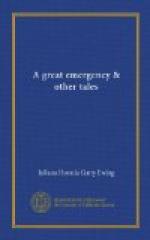“If you touch one stake or bit of moss of mine again,” said I, “I’ll throw my hatchet at your head. I can keep promises too.”
My intention was only to frighten him. I relied on his not daring to brave such a threat; unhappily he relied on my not daring to carry it out. He took up some of my moss and threw it at me by way of reply.
I flung the hatchet!—
My Aunt Isobel has a splendid figure, with such grace and power as one might expect from her strong health and ready mind. I had not seen her at the moment, for I was blind with passion, nor had Philip, for his back was turned towards her. I did not see distinctly how she watched, as one watches for a ball, and caught the hatchet within a yard of Philip’s head.
My Aunt Isobel has a temper much like the temper of the rest of the family. When she had caught it in her left hand she turned round and boxed my ears with her right hand till I could see less than ever. (I believe she suffered for that outburst for months afterwards. She was afraid she had damaged my hearing, as that sense is too often damaged or destroyed by the blows of ill-tempered parents, teachers, and nurses.)
Then she turned back and shook Philip as vigorously as she had boxed me. “I saw you, you spiteful, malicious boy!” said my Aunt Isobel.
All the time she was shaking him, Philip was looking at her feet. Something that he saw absorbed his attention so fully that he forgot to cry.
“You’re bleeding, Aunt Isobel,” said he, when she gave him breath enough to speak.
The truth was this: the nervous force which Aunt Isobel had summoned up to catch the hatchet seemed to cease when it was caught; her arm fell powerless, and the hatchet cut her ankle. That left arm was useless for many months afterwards, to my abiding reproach.
Philip was not hurt, but he might have been killed. Everybody told me so often that it was a warning to me to correct my terrible temper, that I might have revolted against the reiteration if the facts had been less grave. But I never can feel lightly about that hatchet-quarrel. It opened a gulf of possible wickedness and life-long misery, over the brink of which my temper would have dragged me, but for Aunt Isobel’s strong arm and keen eye, and over which it might succeed in dragging me any day, unless I could cure myself of my besetting sin.
I never denied it. It was a warning.
CHAPTER III.
WARNINGS—MY AUNT ISOBEL—MR. RAMPANT’S TEMPER, AND HIS CONSCIENCE.
I was not the only scarecrow held up before my own mind.
Nurse had a gallery of historical characters, whom she kept as beacons to warn our stormy passions of their fate. The hot-tempered boy who killed his brother when they were at school; the hot-tempered farmer who took his gun to frighten a trespasser, and ended by shooting him; the young lady who destroyed the priceless porcelain in a pet; the hasty young gentleman who kicked his favourite dog and broke its ribs;—they were all warnings: so was old Mr. Rampant, so was my Aunt Isobel.




